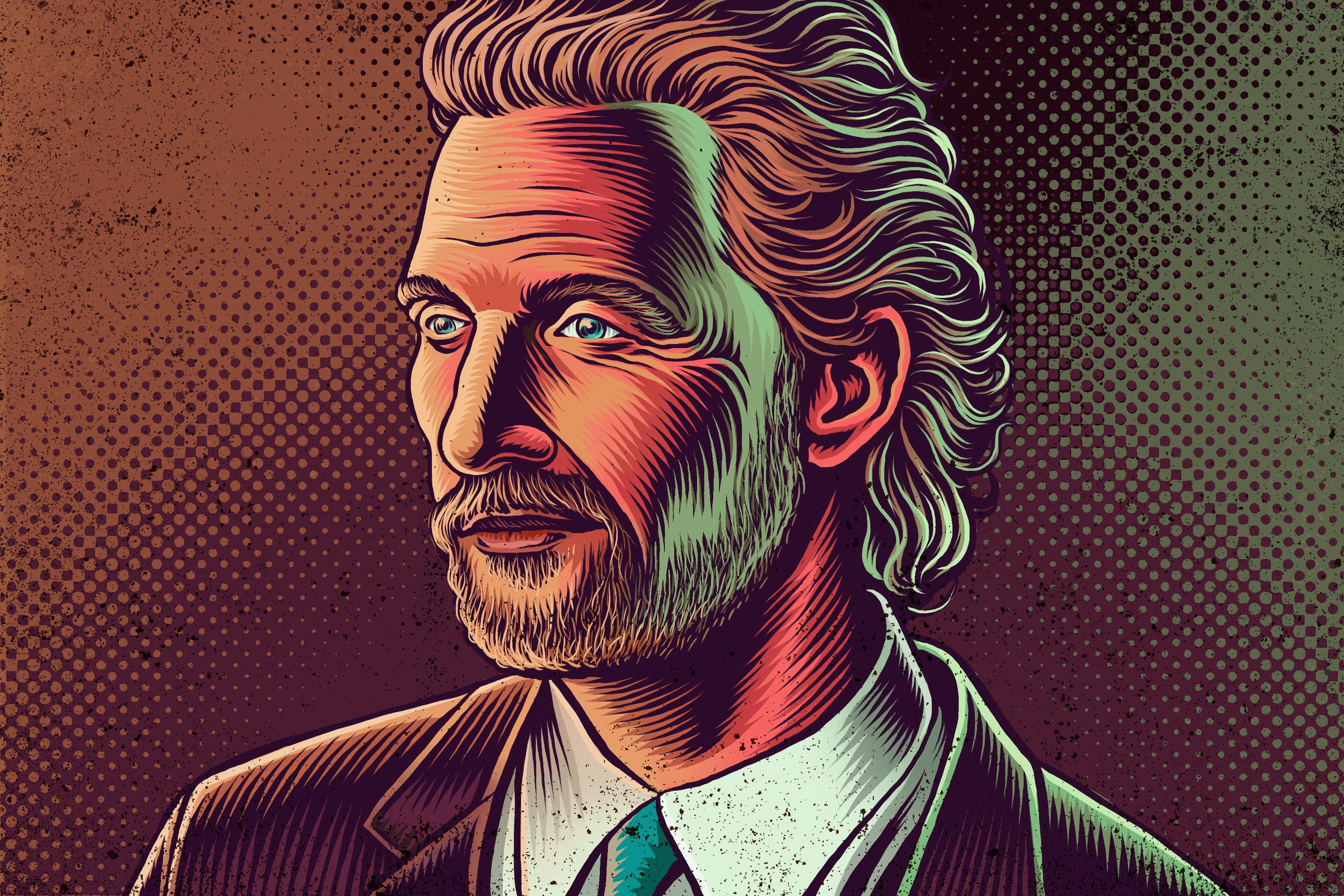
On the Big Picture podcast’s most recent edition of Career Arcs, Sean Fennessey, Amanda Dobbins, and Rob Harvilla discuss Matthew McConaughey and all the roles that made him the megastar he is today. In the following excerpt, they discuss what they each see as his breakthrough performance—how he went from being just, um, alright, to a supernova of winking molasses.
Listen to the full podcast below. This transcript has been edited and condensed.
Sean Fennessey: Rob, you wanted to talk about Dazed and Confused as the breakthrough. What is it about David Wooderson that enraptured you?
Rob Harvilla: First of all, there is no need to overanalyze him. He’s in Dazed and Confused for 10 minutes, maybe. His delivery of the line, “I get older, they stay the same age” is this perfect mixture of casual and formal. He knows the character knows how good a line it is. The actor knows how good a line it is. He takes a little step forward, and in that exact moment I realize that for the first time that he’s wearing salmon-colored pants and a Ted Nugent T-shirt, and it’s just this beautiful transcendent moment that doesn’t need to be belabored—but it’s like, this guy is a star.
The other scene in Dazed that I love rewatching is when he pulls up alongside another car at a burger joint, and the two guys in the other car go, “Oh Christ.” Immediately they can’t stand him, but the driver of the other car, a young redheaded lady who I believe is Marissa Ribisi, is smitten with him in an audience-surrogate sort of way.
I would just follow this man anywhere.
I feel like there’s a version of Dazed and Confused, a studio-focus-group-diluted, belabored version of the movie that feels compelled to have an actual plot and a moral that would make his character not the villain, but the cautionary tale. The worst-case scenario. Like, you don’t want to end up like this guy. Even at the end, when they’re on the football field and he gives the speech about it’s about livin’, L-I-V-I-N, you can take that as really profound or you can take that as kind of pathetic. There’s a version of the movie where the plot is the football player trying to decide whether to sign the promise not to take drugs or whatever. And that moment could be the football player realizing I don’t actually want to end up like this person. But the actual movie can’t bear to do that to McConaughey, and McConaughey’s performance is just too good to even make you feel like he’s even a little bit pathetic. It’s just, it’s a very fine line and just uncomplicatedly a beautiful thing.
Fennessey: It’s amazing how willing we are to forget that that is literally the point of that character is that he is a predator. It’s like, oh, what a charming predator. And that is really his power. This is the first significant role that he had, and it’s one of his best roles. It communicates a lot about the kind of actor that he is, even though he’s on screen for so little time.
Amanda Dobbins: I agree with you. It’s just kind of an instant stardom. I was recently talking about Pretty Woman, and the power of that movie in a lot of ways is that you’re watching Julia Roberts become a star in real time. It’s so rare to see someone in one of their first movies just be fully formed, to have that star quality from the get-go, and he clearly does. Dazed and Confused is his first movie or his first big movie, but also definitely the thesis statement for the rest of his career—or at least the successful parts of his career.
Fennessey: Rob, you and I were having a grand old time recounting some of the ridiculousness of A Time to Kill, which I had forgotten and yet still feel entertained and compelled by. It’s actually quite a gruesome story. If you think Wooderson is a sleazebag, the stuff that happens in A Time to Kill is awful. It’s essentially a courtroom drama about a black man who is on trial for shooting the two men who have raped and shot his daughter. That man is played by Samuel L. Jackson, and his lawyer is Matthew McConaughey. McConaughey is playing, essentially, modern day Atticus Finch, a person who starts the movie out as sort of a wastrel—like a slick drunk Southern courtroom operator. And by the end of the movie he transforms into this morally righteous, profound, emotionally resonant figure.
This movie is really weird.
Dobbins: I cannot believe this movie exists.
Fennessey: It’s so intense and so upsetting. The reason that I chose this movie as his breakthrough is because it’s the first time that McConaughey is in the center of the frame, the whole time. The movie lives and dies by him. And because of its preposterousness, I think almost any other actor wouldn’t have been able to pull it off. And of course there’s a very, very famous speech at the end of this movie.
On the one hand, I remember seeing this movie for the first time and being in tears. I remember feeling like this was a profound moment in American cinema history. It seemed like a revelation at the time. Upon reflection, it probably hasn’t aged that well. Rob, what was it about A Time to Kill that struck you?
Harvilla: Well, now I’m in tears, Sean. I figured I would just do my top three favorite moments from this film, if I may.
Dobbins: Oh boy.
Harvilla: Number three is a tie between the way he pronounces the word “defendant,”—it’s mesmerizing—and the fact that the judge is named Judge Noose. That’s his name. It’s a metaphor. Number two is when McConaughey leaves court to personally punch a hooded, enrobed Klansman in the face in the midst of a Molotov cocktail–throwing race riot that is transpiring outside the courtroom. This is halfway through the movie. It’s a two-and-a-half-hour movie. This is after the first of several burning crosses and before the sniper attack.
Number one is when the Klan burns his house down or blows his house up or whatever, and Matthew McConaughey is sitting in the wreckage afterward looking for his dog and his dog is fine, everybody’s fine, but he’s crying for the second of three times in the movie. He’s wearing a John Cougar Mellencamp tour T-shirt with the sleeves cut off. And everybody in this movie is super sweaty at all times. I imagine there was an industrial strength barrel marked “sweat-parentheses-sexy.”
Dobbins: This movie is so weird. That speech is a five-minute speech in the movie. It is five minutes on Matthew McConaughey’s face as he recounts the extremely brutal and gruesome graphic details of the rape of a young girl, and it just goes on and on and on. And Matthew McConaughey is the source of moral authority. Matthew McConaughey as Atticus Finch, knowing what we know about Matthew McConaughey now, is hilarious to me. I think it’s so funny that we were ever like, yeah, that seems right.
I went back and I was curious about the contemporaneous reviews, and they were pretty positive and pretty credulous. I think it was Janet Maslin in The New York Times that was talking a lot about the Matthew McConaughey star power even then. He was really positioned in 1996 as the matinee idol. He was on Vanity Fair, and she made reference to the media saturation of McConaughey as the sex symbol even before you got to see this movie. And the associative powers of him—like, it’s Matthew McConaughey, almost like he’s Tom Cruise. I think of Matthew McConaughey and Tom Cruise as very different actors at this point in time, but in 1996 they were being positioned the same way. It’s wild to look at now.
Fennessey: We didn’t know that much about him. We had not seen him naked banging on a bongo in a paparazzi photo. And so it was a lot easier to accept him in a role like this. Now, I think because he’s a credible actor, you can see him in The Lincoln Lawyer and buy that he could do something like this. Because of that great voice that Rob was talking about, he’s kind of a perfect lawyer. He’s a perfect speech-giver. You know, he’s kind of made for a movie star soliloquy, even though he doesn’t always seem like the smartest guy in the room.
It’s kind of interesting what he did after this. He went on to make a bunch of other movies that are fine. I can’t recall a big movie star whose films I have skipped more often than Matthew McConaughey, and that’s why it was kind of interesting to go through this. But you know, you’ve got movies like EDtv and U-571 and then you get into The Wedding Planner, which is, I would say beloved by a certain segment of McConaughey fans.
Dobbins: I wouldn’t say that The Wedding Planner is on the top of my list. It’s a fascinating artifact, because obviously Jennifer Lopez is the star and it’s Jennifer Lopez in an interesting moment in her career. So it’s two people doing things that are very different from what they do now. And we have a lot of history with them since then.
It’s a weird movie. There’s some very weird politics between Jennifer Lopez and the guy that she’s supposed to marry until Matthew McConaughey shows up. I don’t know. People watched it, people reference it. It’s certainly in the canon.
Fennessey: We talked a little bit about the mid-2000s and everything that McConaughey did there. Amanda, you went even further into the future for your breakthrough performance. Where did you go?
Dobbins: You guys picked the ones that are obvious. You picked the real ones. I went with Magic Mike. I alluded to the McConaissance earlier and I know we’ll talk about it some more, but after that decade of romantic comedies and weird choices, in 2011 Matthew McConaughey does The Lincoln Lawyer, then he does Bernie, he does Killer Joe, he does Mud. And Magic Mike is kind of when it all clicked together in the public consciousness.
Fennessey: Can’t imagine why that was for you.
Dobbins: It’s extraordinary. I remember at the time, just being like, I can’t believe this is happening. I can’t believe it’s Matthew McConaughey fully greased up. You thought he was sweaty in A Time to Kill.
Fennessey: They should have put that on the poster.
Dobbins: I think it’s important that this is a supporting role. We should talk more about his supporting roles. It’s when this new phase of McConaughey really solidifies and you think, oh wow, he can do some different stuff. He can be that bongo guy on screen. But it’s also when people really started investing in McConaughey as this weirdo, I think because Magic Mike was, for obvious reasons, something of a cultural phenomenon.
Fennessey: It sure was.
Dobbins: Thank you Steven Soderbergh, forever and always. I think this is when the McConaissance really takes off. This is how you get to True Detective. It’s how you get to an Oscar. It’s where he levels up, and so it’s a breakthrough to greatness.


